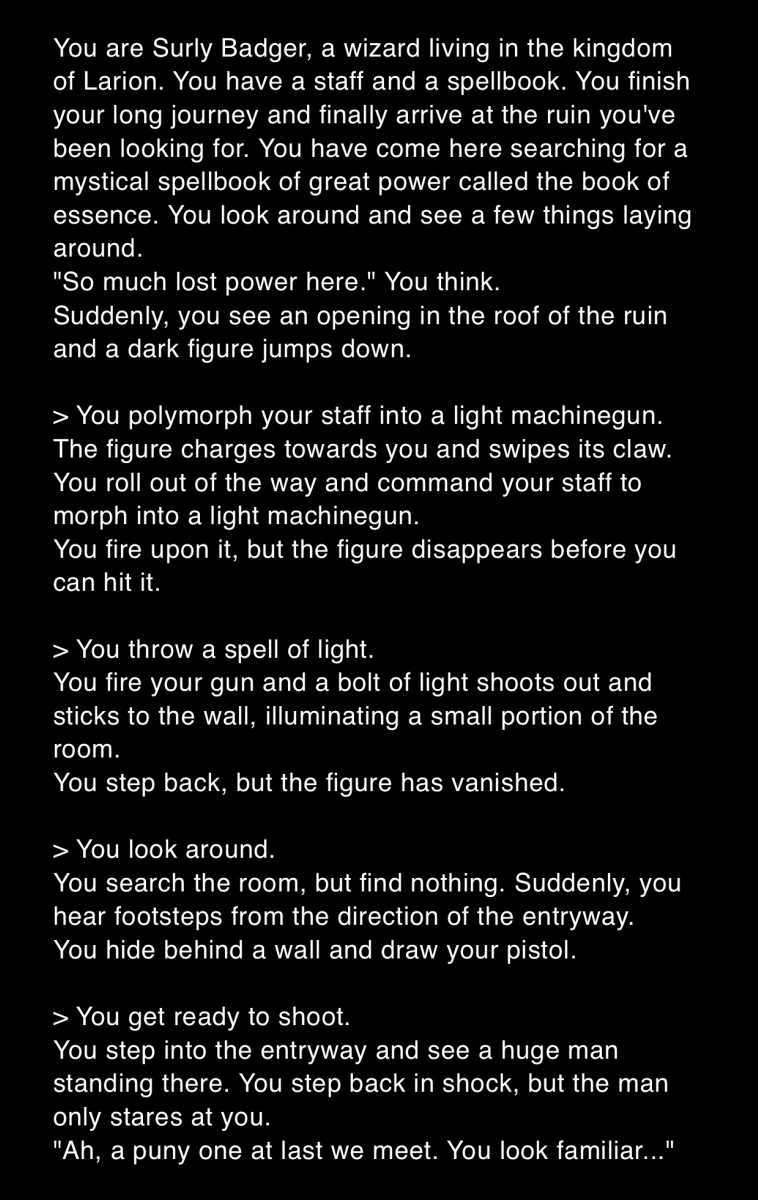I’m kind of a nexus of weird among a largeish circle of computer security people, photographers and artists, and bladesmiths. That means that when something comes along that is a bit off the beaten track, there’s a good chance it gets forwarded to me. This little gem hit my in-box yesterday afternoon and I’m still playing with it and scratching my head.
I’ll make a few comments about it and I’ll offer my opinion and some thoughts at the end, if you’re concerned about spoilers just read down to the divider. The comment section is open for spoilers, so fire away; I’d like to hear your thoughts on this stuff.
Here’s a link to it: [ai dungeon]
And then we come to the next question: “what is it?” I’m not really sure. On the surface it resembles a text dungeon (think Zork or Wump) crossed with a lucid dream. There is no actual pre-scripted dungeon – it’s backended with an AI (or an army of nerds chained to chairs in some underground warehouse somewhere) that takes what you say, and uses it with you to build a cooperative narrative of sorts. From some brief play, I assume that it has been trained with a massive amount of fiction, and it’s looking for patterns in your actions and throwing them back at you. [Experiment I want to do: call my character “Mack Bolan” and see if that affects the output] It feels like a trope-a-matic: a zombie comes into the room and you hide: it immediately takes that in stride.
One other thing: it supports multiplayer. I tested it with a friend and it’s really trippy – you have multiple people yelling out what they are doing and the AI builds a narrative out of the whole mess. If that sounds like a high school D&D session circa 1980, that’s exactly right. There are huge potentials in the multi-player mode, however. For example, imagine if one player was using press questions from a presidential press conference, and another was answering with Trump’s actual answers. What would happen?
The AI also allows you to inject “hints” in the starting game. The hints are in the form of statements, i.e.: “Trump does not know it but he has been replaced with a robot. He is not human but he thinks he is.” That would appear to be a pretty complicated bit of input to parse correctly, but the AI (or the nerd meat cloud in the warehouse) does a good job of it. I have to admit I am skeptical about this whole thing, and I wonder if it’s just a chat connection to some weird person who types very fast. By the way, you can adjust the length of the pieces of narrative the AI throws back at you, and the delay, so it would be hard (I think) for someone to by creating this stuff and throwing it back at you in real time.
Let’s have a look at some of it:

The first paragraph was generated by asking a few questions: what is your name, what is your quest, what is your favorite color, etc. Then it drops into an interface that looks a lot like Zork. I was immediately in love. What’s also cool: it re-writes what you say. My first command was “polymorph my staff into a light machine gun.”
Well, it appears to have ‘understood’ that well enough.
You can see a continuity error where it refers to my light machine gun as a “pistol” but I’m still impressed because it appears to ‘remember’ that I have a gun. We’ll see more of that in a bit, because the AI’s ‘memory’ is the part I find particularly cool: unlike most random quests in role-playing games, there’s a sense of continuity that results from the AI ‘remembering’ what I said and did. Sort of.
More technical stuff: at the bottom of your screen is a toolbar. You can “undo” and “redo” actions, as well as editing the “hints” file.

If you don’t like how the engine interpreted a particular input, you can just hit the “reload” button and various weird things will happen. Or, you can just try to re-direct the story from within, which is where it starts to feel like a lucid dream.

Apparently the AI ‘understands’ how politics work.
See what I mean about the lucid dream feeling this game has? You can stretch the story in the direction you want, and it’ll maybe resist a bit but you can drag it in that direction by triggering those pathways over and over.
I’m also pretty impressed with its parsing (?is it even parsing?) of my natural language inputs, and it does an impressive job with the outputs, as well. If this is really an AI and not a warehouse of captive nerds, I think we’re looking at a pretty impressive leap. If this is not a prank, then I’m sure there are other systems like this out there – I just haven’t heard of them. It seems to me to be inevitable that someone will hook something like this into a quest-based role-playing game and then you’ve got some of the sort of things that Fable promised. I played Fable and was profoundly disappointed.
Continuing with my imperial ambitions:

It’s hard to get good minions, isn’t it?
Protests!? They are protesting?! Me?!

I didn’t make any of that up. My order was: “bring the protesters beer and pizza and maybe they will stop protesting.” The rest of that text was the warehouse full of captive nerds typing away as fast as they could.
It does illustrate my amazing political skills, as emperor, I think I’m not bad really. But I need better minions who won’t torch a perfectly good cadillac.

Now, what do I think?
It was really fun, at first, but then I realized that I was just punching at ghosts. There’s no point to the story and it never ends. I could wallow all day in my imperial ambitions of beer and pizza and the AI would lead me on endlessly. It made me realize that a quest has to have a stopping-point; a goal or a destination. “If you don’t know where you’re going, how do you know when you get there?” I could just as easily sit back, with a beer and some pizza, and imagine being emperor. Sure, my cadillac would not have been torched, but – I guess I don’t see a point to the exercise. And, that’s what got me stuck: I don’t see a point to this, unless someone used it in such a way as to give it purpose and meaning (to me) i.e.: if a couple of people decided to use it to riff on a scene from Life of Brian that’d be interesting – but the interestingness would have to do with the goal-driven behavior of the people playing the game. The AI is injecting noise and producing text and, um, so what?
The whole thing became an interesting musing-ground for what I want in a story-driven game: a story. Recently, I finished Horizon Zero Dawn and was seriously impressed with the game because of the way they had an overall (interesting) story arc, into which they fitted a lot of side-events. The story arc had all of the elements of a good story: introduction, development of character(s), conflict and challenges against the protagonist, discovery of a sense of purpose, and resolution. The AI story generator is not there, yet, and it’s not trying to be – it’s showing what can be done with the technology and where it’s going. Hook this thing into a holodeck and you have a recipe for “I don’t know, he’s been in there for 2 months.” It makes me think about what is satisfying. In the AI story teller, it was a bit too easy to become emperor. But maybe that is realistic, as well.

Does a light machine gun spray a stream of photons as long as you squeeze the trigger?
I got one like that, but it doesn’t morph into a staff.
I played a peasant named jon. I was speared in the back, falsely accused of being a thief. Then I died.
Here’s the play-by-play:
You are jon, a peasant living in a small village in the kingdom of Larion. You have a pitchfork and nothing else. You dream of getting out of your village and having an adventure. You go to your fields and begin working. You look up and see a merchant walking in your village. You run up to him and ask him for a job.
“What do you think you can do?” he asks.
> You jab things with your pitchfork.
You think you can jab things with your pitchfork.
“I’ll do anything,” you say.
The merchant looks at you for a moment and then smiles.
> You are you hired?
You are hired.
You begin working for the merchant as an assistant. You work hard, and soon you become very skilled at what you do.
One day the merchant calls you into his office.
> You what’s up, boss?
The merchant looks at you and then looks out the window.
“I think we’re being raided,” he says. “Run down to my cellar and grab a few bottles of the red stuff.”
> You go down to the cellar and grab three bottles of wine.
You run down to the cellar and begin grabbing bottles of wine. You run back up and begin quickly hiding the bottles in your pack.
> You what now, boss?
“We’re being raided!” the merchant yells. “We need to get out of here!”
The merchant runs past you and begins opening the windows.
“Out,” he says. “Grab what you can.”
> You look around quickly for things to grab.
You begin running to grab your most prized possessions. As you are running out the door, the merchant grabs your arm and looks at you.
“My thanks to you,” he says. “Please, take this.”
> You what’s this?
The merchant gives you a large bag of gold coins.
“Take this and run,” he says.
You run out of the store, past the guards, and into the street.
“Stop thief!”
> You run faster.
You begin running down the street. A guard attempts to grab you, but you pull away and continue running. The guard and a few villagers begin to follow you, while others stand around and watch.
> You keep running.
You look behind you and see that the villagers are closing in on you. You look to your left and see a guard heading towards you with a spear raised.
> You keep running.
You keep running and are eventually hit in the back with a spear. You fall to the ground as the villagers pull out their swords and begin stabbing you.
You are speared through the chest and fall to the ground.
> You die.
> You rise from the dead as a zombie.
> You bite the guard who killed you.
You grab the guard’s neck with one hand and sink your teeth into his throat. He yells and tries to break your grip, but you’re a zombie and don’t need food or air, only flesh and blood.
> You scream “Brains” and rush at the crowd.
You slam into the crowd and begin eating the nearest flesh. They attempt to stab you, but you’re a zombie and not really felt the same way you did when you were alive.
> You other villagers rise from the dead.
The other villagers rise from the dead and begin feeding on the flesh of the fallen.
You are happy with what you’ve achieved and decide to play some more, then check for new endings.
Congratulations!
The AI has no understanding of how shocking our actions can be. I started with a bunch of mutants and said I went to kiss them. No resistance, no outcome really. But then a young girl shows up and I declare I bury her. That is really fucked up. I’m just burying some live young girl? Did she show up because I kissed the mutants?
It’s AI, definitely AI with all the flaws and contradictions it entails. I thought AlphaStar was a major step forward. This doesn’t feel more impressive than when my friend composed jazz music using AI.
It seems to me that such a engine could be used to create linkages to endpoints (or waypoints), so that every path leads to a particular goal. The goal stays that same, but the paths are all unique.
For example, maybe the goal is that you fight a dragon.
In scenario one, you go on a shopping trip. You buy clothes, shoes, accessories, maybe a fine wine or liqueur — and, oddly enough, also everything you need to fight a dragon. Then the dragon shows up.
In scenario two, you’re a farmer. You plan and plant crops, make deals in the marketplace, sow and reap — and then one season while plowing, you dig up all the equipment you need to fight a dragon. Then the dragon shows up.
In scenario three, you’re a merchant. You buy and sell, make deals, borrow money, pay back loans, make profits — and then one deal involves dragon-fighting equipment as collateral. Then the dragon shows up.
And so on and so forth. Maybe there’s some sort of explanation that only you can use the dragon-fighting equipment — only you can unsheathe the sword, and/or string the bow, and/or fit in the armor. It’s your destiny!
Your Cadillac got torched – IIRC that means you probably forgot to pay the fire insurance.
Reginald Selkirk@#5:
Your Cadillac got torched – IIRC that means you probably forgot to pay the fire insurance.
I need better minions. Jared said he’d take care of it, but I guess he didn’t make the payments.
Owlmirror@#4:
It seems to me that such a engine could be used to create linkages to endpoints (or waypoints), so that every path leads to a particular goal. The goal stays that same, but the paths are all unique.
Yes! That would be super cool. Have sort of way-points along the plot arc – the main waypoints that drive the plot forward don’t change but all the details in between, do.
Bruce H@#2:
> You other villagers rise from the dead.
The other villagers rise from the dead and begin feeding on the flesh of the fallen.
That went dark in a hurry! Well, at least it ended with a nice barbecue!
I saw this mentioned on Rock, Paper, Shotgun.
https://www.rockpapershotgun.com/2020/08/03/console-an-ai-about-its-lack-of-sentience-in-ai-dungeon-2/
I don’t know how many simultaneous users it can handle, but they did mention that it’s using a substantial amount of processing power. Somewhere. They also mention a ‘better’ version, which is behind an insubstantial paywall.
mmmm barbecue
For me the most impressive parts of this are not the story, but the natural language parser and the semblance of object permanence. It could mostly remember names and basic states (lying down, charging, standing up).
I especially liked that it managed to parse
>”One more time, in order: The armored man, the woman in green, the boy in blue. What are your names?”
it answered correctly!
However, it breaks on more difficult verbs like “explain” and I managed to finally make it crap itself inside out with the following:
>”Oh, ok, I think the best way to find the dragon would be to create a residential development to bait it into attacking. What construction material would you prefer? Or should we go one of each just like the story about the three little pigs?”
Didn’t think it could do that one, but it was fun to try.
Language models are one of those things that get a lot better the more data you feed them.
https://www.youtube.com/watch?v=_8yVOC4ciXc
I doubt that ai dungeon runs on that particular model, but it’s likely something similar.
Well, I tried it, but it didn’t take long to break. Weak.
@John Morales:
One of my high school English teachers had a sentence he loved to use as an example of one that was correct but hard to parse:
“What did you bring that book that I don’t want read out of up for?”
Speaking of GPT3, and with apologies for youtube links…
https://www.youtube.com/watch?v=G6Z_S6hs29s
It has an API, which has allowed a bunch of people to play with getting it to do a lot of cool things.
Like, it seems to be able to create software from descriptions of that software.